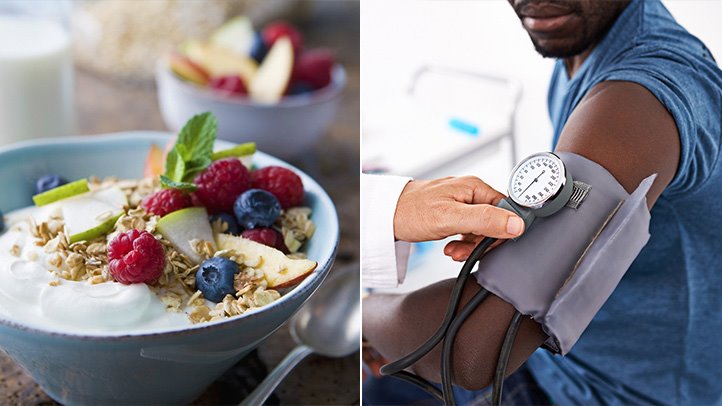High blood pressure, also known as hypertension, can be caused by a variety of factors, including being overweight and eating an unhealthy diet that is high in fat, salt and cholesterol. High blood pressure can wreak havoc on your body, causing damage to the arteries, heart, brain, kidneys and eyes. Left uncontrolled, hypertension can lead to heart disease, stroke and even death.
The switch to a healthier lifestyle, particularly maintaining a healthy diet, is key in the treatment of high blood pressure. Foods that are low in salt, fat and cholesterol comprise the best hypertensive diet to help keep your blood pressure in check and manage your weight. The more salt you eat, the more blood pressure will increase.
- Substitute salty, high sodium foods for fruits and vegetables. In addition, high fiber foods, such as whole grains can help lower blood pressure.
- Boost potassium intake with fruits, vegetables and supplements, if needed. Potassium can lessen the effects of sodium on your blood pressure.
- Eat fewer processed foods. Sodium occurs naturally only in low amounts. Processed foods are often high in sodium as a preservative.
In addition to eating a hypertensive diet, if you have been diagnosed with hypertension, here are eight tips to reduce your risk of serious health complications.
1. Limit alcohol intake
Overtime, regular alcohol consumption can result in high blood pressure. Some alcoholic beverages are also high in calories, which can result in weight gain leading to high blood pressure. If you choose to drink alcohol, limit your intake of beer, wine and liquor to keep within the dietary guidelines of one drink per day for women and up to two drinks per day for men.
2. Cut back on caffeine
Drinking too much caffeine (i.e. more than four cups of coffee) per day can increase blood pressure. In addition to the caffeine found in energy drinks and sodas, many drinks also contain high amounts of sugar, leading to weight gain and potentially high blood pressure, among other risks. Coffee and tea can be consumed as part of a healthy diet but water should always be your primary source of fluid.
3. Stop smoking
Smoking puts you at a much higher risk of heart attack or stroke as it causes the arteries to narrow. If you have high blood pressure and are a smoker, risk for serious complications is significantly higher. In addition, smoking may cause other health problems such as lung disease and cancer.
4. Get regular exercise
Being physically active through regular exercise helps improve the condition of your heart and blood vessels. Routine exercise can also help you lose weight and maintain a healthy weight, thereby lowering blood pressure. The American Heart Association recommends that men and women get at least 150 minutes of moderate-intensity exercise each week. If you are new to exercise, work with a certified professional trainer to develop a fitness plan that is best for you.
5. Maintain a healthy weight
When you are overweight, your body must work harder to pump blood from the heart to your organs, which in turn causes an increase in blood pressure. Hypertension or high blood pressure is commonly associated with high body mass index (BMI). If you are overweight, even losing a few pounds can make a difference in your blood pressure and overall health. Following a weight loss meal plan getting regular exercise will lay the foundation to help you reach a healthy body weight and BMI.
6. Reduce your stress
Over time, chronic stress may be a contributing factor in high blood pressure, though research is limited in the exact effects of chronic stress on blood pressure. One thing that is clear: high stress levels often lead to behaviors that may be detrimental to your health, such as stress eating, drinking alcohol or smoking. Stress can have many causes, such as work, family situations, finances and illness. You must first identify the source of your stress before you can take measures to reduce or eliminate that stress. To lower your stress levels, take time to relax and do activities you enjoy.
7. Get plenty of rest
Over time, sleep deprivation can reduce your body’s ability to regulate stress hormones, resulting in high blood pressure. To improve blood pressure, be sure you are getting plenty of time to sleep. Adults should get six to eight hours of sleep each night.
8. Seek support
Build a support system of friends, family and healthcare providers around you who will encourage you to make healthy lifestyle changes to keep your blood pressure low.
If you are overweight or obese and suffer from high blood pressure, it may be time to talk to a weight loss doctor about medical interventions that can help you reach a healthy weight and reduce your blood pressure and other risk factors. Contact First Baptist Medical Center today to speak with a Dallas weight loss doctor.





